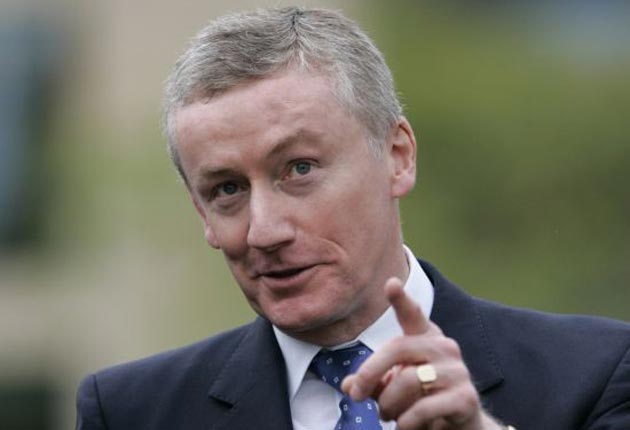Peer attacks Sir Fred Goodwin's legal gag

The public have a direct interest in knowing whether the former head of the Royal Bank of Scotland Sir Fred Goodwin had a relationship with a senior colleague, a Liberal Democrat peer said today.
Lib Dem MP John Hemming used parliamentary privilege in March to reveal Sir Fred, chief executive of the RBS before it was nationalised, had taken out a super-injunction, although he did not reveal any details.
Today Lib Dem Lord Stoneham of Droxford said in the House of Lords: "Every taxpayer has a direct public interest in the events leading up to the collapse of the Royal Bank of Scotland, so how can it be right for a super-injunction to hide the alleged relationship between Sir Fred Goodwin and a senior colleague.
"If true, it would be a serious breach of corporate governance and not even the Financial Services Authority would be allowed to know about it."
Justice minister Lord McNally replied: "I do not think it is proper for me, from this dispatch box, to comment on individual cases, some of which are before the courts."
Lord Stoneham made his claims, using Parliamentary privilege, a day before Master of the Rolls Lord Neuberger is due to publish his report on super-injunctions.
The peer raised the issue at question time in place of Lib Dem former Treasury spokesman Lord Oakeshott of Seagrove Bay, who had been down to ask a question on the subject and has previously called for details of Sir Fred's super-injunction to be made public.
Lord Stoneham, 62, joined the Lords only this year after working as operations director for the Lib Dems since 2004.
He was previously group production director of News International from 2000 to 2002 and the company's HR director from 2002 to 2003.
In later exchanges on super-injunctions, Lord McNally revealed that the Ministry of Justice did not know how many had been issued and were in operation.
Former lord chancellor Lord Falconer of Thoroton, a Labour frontbench spokesman, said he agreed with Lord McNally about the "extent one shouldn't use privilege to go against the terms of court orders".
But he asked: "To what extent is the Government considering the extent to which the hearings in which super-injunctions are granted, or, indeed, any privacy injunctions are granted, are open to the press?
"One of the problems is that they do not know what the process is. The press are reliable when directed not to disclose what goes on in criminal trials. Why can't they be present when secrecy injunctions or super-injunctions are granted?"
Lord McNally said he hoped the Master of the Rolls had been considering the issue in his review.
Lib Dem Lord Thomas of Gresford asked how many super-injunctions had been issued and were in force.
"Hugh Tomlinson QC, the leader in privacy law, tells me the Ministry of Justice has no idea," he said.
"Perhaps the minister would send a runner down to the Royal Courts of Justice to find out how many there are. The Times says 30, other newspapers say 800."
Lord McNally replied: "I have to confess that the Ministry of Justice do not have a figure on the number of super-injunctions.
"I do understand that the Ministry of Justice chief statistician is looking into the matter and we do hope to be able to to give those figures shortly."
Labour ex-minister Lord Davies of Stamford asked: "Is not the right to a private life with acceptable privacy an essential and indeed defining characteristic of a free society, although there must always be an override where there is a connection between private behaviour and the fulfilment of public responsibilities, including voting and speaking in Parliament?
"In that connection, is it not intolerable that important sections of the media, in pursuit I think of a commercial agenda in competition for getting more titillating material for increasing their sales, think nothing of regularly bribing informants, of surreptitious surveillance and photography, of tapping telephones, of using the methods normally associated with the activities of a secret police in a totalitarian society?
"Is this not a national disgrace and should not Parliament and the Government face up to its responsibilities and legislate on this issue?"
Lord McNally said that in a free society it was important to recognise privacy.
But he added: "Also in a free society we recognise the need for a robust and free press. In the catalogue of sins you laid down there, this does throw a challenge to our press.
"I think the press has a duty to look to put its own house in order to see if some of those faults you outlined shouldn't be more robustly dealt with by the self-regulation that they claim to be so proud of."
Lord Lloyd of Berwick, a former law lord, told peers: "Of course the judges take the public interest into account when deciding whether or not to grant a super-injunction."
And he asked: "Will you accept, as has been said so often, that the public interest in this question is not to be equated with what may be of interest to the public?"
Lord McNally replied: "What is of interest to the public can include areas that intrude into private life. Again, we are looking very carefully at these matters.
"The very fact that there is so much discussion and public debate means that it has been sensible to get the Master of the Rolls to look at these issues.
"When we have the full knowledge of his deliberations, we will be making statements on steps forward."
Join our commenting forum
Join thought-provoking conversations, follow other Independent readers and see their replies
Comments
Bookmark popover
Removed from bookmarks